Three Students Present Research at ACLA Conference
April 18, 2019 — Mayesha Awal (C’20), Karla Leyja (C’19), and Angelica Rossi-Hawkins (C’21) had something of a nontraditional spring break.
While many of their peers went home or took vacations, the three students stayed on campus to present original papers at the 2019 American Comparative Literature Conference, the country’s largest annual gathering of comparative literature scholars.
Each presented their research papers as part of the conference’s undergraduate research seminar, “Spaces of Otherness in a Globalized World.” Awal’s paper was titled “The Political Takeover of Mentalities: The Otherization of Both the Jew and the Arab;” Leyja’s, “From Affect to Memory: Challenging the Borders of Latinidad in Literature;” and Rossi-Hawkins’ “The Contagion of Nationalist Othering: Mediterranean Colonialism in Miramar and Memoria del Vuoto.”
More than 80 students from around the world applied to participate in the undergraduate research seminar; only 15 were selected.
“Of the 184 multiday panels that comprised the ACLA conference, the Undergraduate Seminar was particularly dear to me,” said Professor Nicoletta Pireddu, who organized the conference. “I believe it is crucial to offer undergraduate students meaningful opportunities to showcase their research, and I am very proud of the sophisticated comparative scholarship that our panelists presented. I could have not asked for a better outcome.”
Awal’s paper focuses on “the relationship and the ‘otherization’ of the Arabs and Jews of the Israeli-Palestinian Crisis through the analysis of various works of literature.” Drawing from works by Benjamin Tammuz, A.B. Yehoshua, Amos Oz, and Sayed Kashua, Awal addressed themes of “love, separation, death, growing up in the middle of the conflict, identity, and courage” in what was originally her final paper in Prof. Maital Orr’s “Re-examining the Middle-Eastern Crisis Through Literature and Film” class.
“The characters in these works often have to face the reality of the trauma that arises as a result of the political conflict,” Awal said. “What I find intriguing is how thoughts of these characters often give rise to nostalgic recollections of the days where the Arabs and the Jews did not see one another as the ‘other,’ prior to political conflict and hostilities among different families.”
Rossi-Hawkins’ paper stems from a project she began while enrolled in the Liberal Arts Seminar, an intensive humanities course exclusively for first-year College students. She examines themes of colonial oppression and decolonization through Frantz Fanon’s Wretched of the Earth, then analyzes “the tension between multi-faceted reality and the vestiges of colonial polarity” through Naguib Mahfouz’s Miramar and Marcello Fois’ Memoria del Vuoto.
“In high school, I had been taught to study culture — history, literature, and art — within parameters dictated by modern political borders,” Rossi Hawkins said. “In the Liberal Arts Seminar, I began to perceive Mediterranean countries as a cultural unit. As an Italian, this new way of thinking of my native region deeply challenged me and excited me. … My essay for the ACLA is the first of many forays into this subject.”
The Georgetown participants in the research seminar came away with valuable feedback on their work and a powerful first impression of high-level academic inquiry.
“I had the honor of listening to perhaps the most intelligent group of people within my age group that I have ever met,” Rossi-Hawkins said. “I was simultaneously challenged and moved not only by my co-presenters’ arguments, but by their sophistication and variety.”
“What I found most fulfilling about my experience is that the undergraduate seminar paralleled the experience of graduate students and academic professionals,” Awal said. “In the future, I aspire to acquire my Ph.D. and pursue a career in academia, so I am very grateful to have had the opportunity to participate.”
